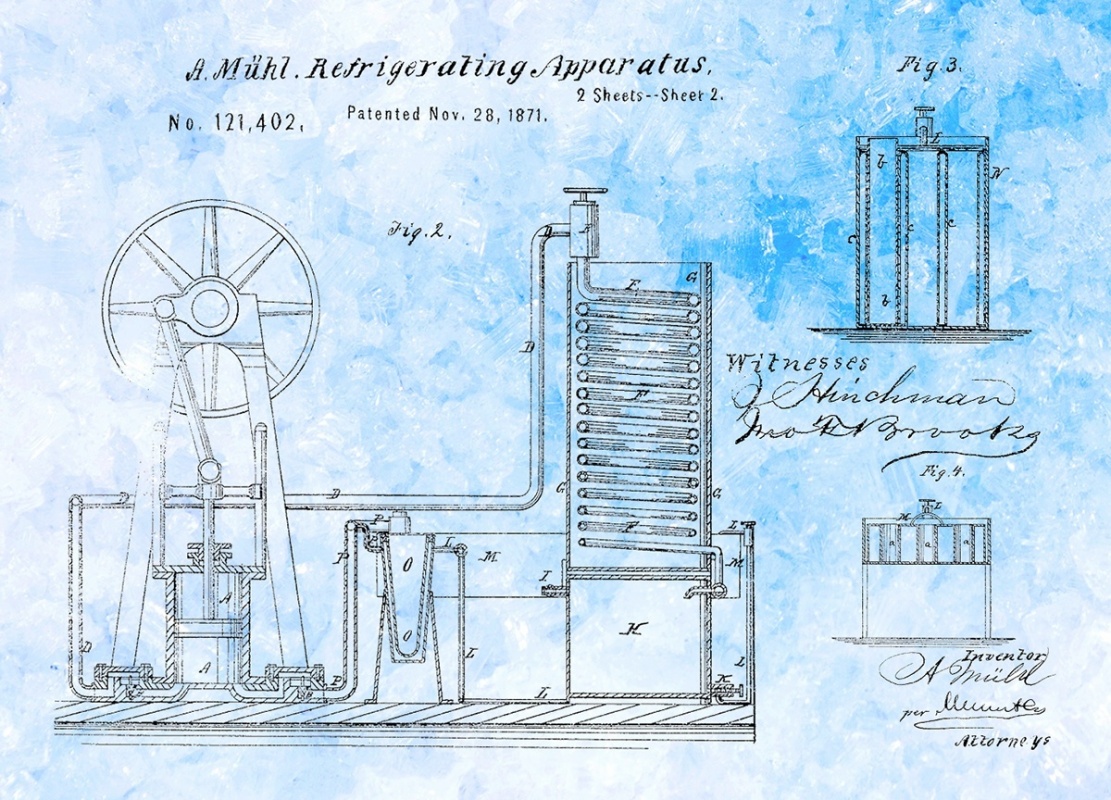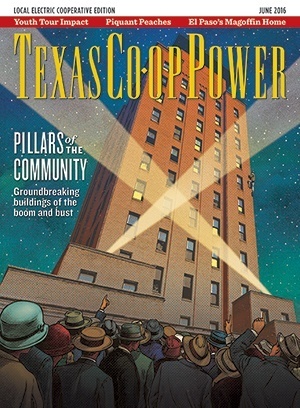Stories of our ancestors drift through our family trees like falling leaves, while memories are preserved like pieces of a patchwork quilt. We may know from whence we came, but a little mystery must ever remain.
That certainly has been the case with Waco native Jamie Muhl’s research into the accomplishments of his great-grandfather, Andrew Muhl (1831-1892). His relative helped keep Texas cool in the 19th century as a patent holder of an ice machine and an air conditioner.
“When I was 12, relatives told me that he invented air conditioning and patented an early ice machine.” says Jamie Muhl, a member of Navasota Valley Electric Cooperative. Muhl, a retired homebuilder, has been tracking his great-grandfather for several years. And while he is careful to note that others are credited with pioneering our summertime salvation of AC, he has unearthed documentation that Andrew Muhl did, in fact, do a lot of really cool stuff.
Andrew Muhl was a native of France and studied mechanics in Paris. “He was a contemporary of Ferdinand Carré, who invented the ammonia vapor absorption cycle manufacturing machine in 1858,” explains Muhl. “We believe he [Andrew Muhl] learned how to work on that machine and began developing his own ether ice machine there.” About 1865, Andrew Muhl sailed for Mexico, to make his fortune producing ice cream. He eventually wound up in San Antonio.
That move proved fortuitous. Before the Civil War, Texans savored natural ice imported from the northern United States at great expense. After the war, Texas became a leader in pioneering the production of artificial ice. “While continuing with his own inventions,” Jamie Muhl adds, “Andrew may have worked on a Carré machine in San Antonio that came into Texas through Matamoros.”
Digging through newspapers in the San Antonio Public Library, Muhl confirmed that his ancestor was involved in ice production. A mention in the San Antonio Daily Herald from May 6, 1869, mapped Muhl’s research trail north to the capital city. “We learn that Messrs. Muhl and Paggi of this city have engaged to take one of their Ice Machines to Austin and run it for the benefit of the people of that one-horse town,” the paper wisecracked.
At the Dolph Briscoe Center for American History in Austin, Muhl found letters in French from his great-grandfather to J.B. LaCoste, an early San Antonio water works and icehouse entrepreneur, encouraging LaCoste and associates to get their machines working before they were scooped by the competition.
One of the letters was written in Waco, where Andrew Muhl moved in 1871 after receiving an inquiry about an ice machine from a druggist there. Recalling Andrew Muhl’s Waco icehouse in a 1944 article, the Waco Sunday Herald Tribune wrote in a headline that “Waco Feared Muhl’s Ice House Would Freeze Innards.” In 1872, Andrew Muhl received some national publicity when Scientific American magazine ran a story on his ether ice machine, noting that it had been in operation in Texas since 1867. Two years later, the Franco-Texan was awarded a patent for “Improvement in Apparatus for Cooling the Air of Buildings.”
To date, Jamie Muhl’s research trail has taken him to 30 research sites. In 2015, he traveled to Chicago for the Winter Conference of the American Society of Heating, Refrigerating and Air-Conditioning Engineers. Thanks partly to Jamie Muhl’s research, ASHRAE historians formally recognized Andrew Muhl as a Pioneer of the Industry.
Jamie Muhl also trekked to Columbus, Georgia, where a foundry made a deal with his great-grandfather to build four of his machines in 1872, shipping one of them to Havana, Cuba. As none of Andrew Muhl’s U.S. machines exist, Jamie Muhl hopes to travel to Cuba. “You never know,” he muses. “They keep vintage American cars running with such ingenuity; maybe they’ve got an Andrew Muhl machine that’s still making ice.”
——————-
Gene Fowler is an Austin writer who specializes in history.


